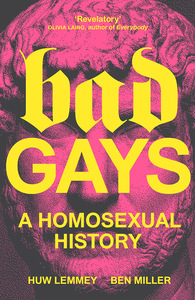You need to sign in or sign up before continuing.
Take a photo of a barcode or cover
I found this super interesting and they talk about a really interesting thing throughout the book that I feel very strongly about, which is that our modern perceptions of 'gay' are not applicable to the past because sexuality changes with time and society and culture.
But I did lose interest at certain points so there were times I found it hard to focus
But I did lose interest at certain points so there were times I found it hard to focus
1. It feels incredibly disingenuous to brand this book as being about the horrible, awful LGBT folk of history past, and then have 90% of the people mentioned be, basically, fine. Like, they're not heroes, but the standards presented here for what makes someone a "bad" person are way too modern and (forgive me for this phrase) "politically correct."
2. Only including ONE woman and ONE person of color as subjects is... disheartening. Also, having that one woman be Margaret Mead was dumb. She's obviously not above criticism, but come on, man - she's possibly the most important anthropologist in western history who dedicated her life to promoting values like sex positivity, feminism, and racial equality. And the section on Margaret Mead seemed, to me at least, significantly harsher in tone than any of the other sections.
3. Tying into my above point, the range of what counts as "bad" is way, way, way too broad. On what planet are literal fascists equivalent to some guy writing dirty poems? The idea that these are all gays "condemned by history" for being "bad" doesn't even work - even if Margaret Mead, Yukio Mishima, Pim Fortuyn, Hadrian, and Lawrence of Arabia are all widely considered incredible and important historical figures, in spite of (or, in many cases, because of) their "bad" actions! The method of judging who 'counts' as a 'bad gay' for the purposes of inclusion in this book are sloppy.
4. A lot of the promotional material for this book, and many of its positive reviews, talk about a incredibly engaging and witty, jokey tone - that's just not how this book reads. It's pretty boring for long sections at a time with very little in the way of clever, funny asides.
2. Only including ONE woman and ONE person of color as subjects is... disheartening. Also, having that one woman be Margaret Mead was dumb. She's obviously not above criticism, but come on, man - she's possibly the most important anthropologist in western history who dedicated her life to promoting values like sex positivity, feminism, and racial equality. And the section on Margaret Mead seemed, to me at least, significantly harsher in tone than any of the other sections.
3. Tying into my above point, the range of what counts as "bad" is way, way, way too broad. On what planet are literal fascists equivalent to some guy writing dirty poems? The idea that these are all gays "condemned by history" for being "bad" doesn't even work - even if Margaret Mead, Yukio Mishima, Pim Fortuyn, Hadrian, and Lawrence of Arabia are all widely considered incredible and important historical figures, in spite of (or, in many cases, because of) their "bad" actions! The method of judging who 'counts' as a 'bad gay' for the purposes of inclusion in this book are sloppy.
4. A lot of the promotional material for this book, and many of its positive reviews, talk about a incredibly engaging and witty, jokey tone - that's just not how this book reads. It's pretty boring for long sections at a time with very little in the way of clever, funny asides.
funny
informative
reflective
fast-paced
Reading this book felt like sitting down for a deliciously juicy gossip session with a friend you haven’t seen in a while. It’s fun while also maintaining a level of sharp and astute analyses, informative without being too dense, and highly intersectional, scoping out a variety of various historical figures across the globe. I also appreciated the way the authors acknowledged the way historical events cascaded (see: Britain’s involvement in Palestine) as well as how in-depth the research in this book reached. I think this is a great book for those looking to mix up their Pride month reading and I’d highly recommend this for lovers of queer history or history in general!
informative
medium-paced
fast-paced
funny
informative
inspiring
fast-paced
a fascinating look into a handful of the more unsavoury and problematic Queers of history and how they shaped and were shaped by ideas about queer identity.
I really enjoyed the book but would have preferred a little more comment from Lemmey and Miller on the relationship between their Queerness and their actions
I really enjoyed the book but would have preferred a little more comment from Lemmey and Miller on the relationship between their Queerness and their actions
informative
reflective
slow-paced
Expected this to be a slam dunk for me but I have mixed feelings!
I wish there had been some kind of parameters established for what "bad" is classified as in this collection. It bothered me that there was such a range of morality all clumped together without delving into those distinctions more explicitly. One guy just wrote bawdy stuff in the Renaissance whereas others were legit Nazis! The level is not the same!! I also feel like the unifying thread got a bit lost for me? Based on the intro, it seemed like the focus was going to be on white gay men for a specific reason so I wasn't surprised that they dominated the collection, but with the inclusion of Maragret Mead and Yukio Mishima it clearly isn't the case, so why does the collection focus so heavily on this limited selection? (Also many of these are bisexual, which kind of gets acknowledged but also kind of doesn't?)
I could very much tell this is based on a podcast in the way it was written and it didn't always work for me as a result - it felt like sometimes we got bogged down in summarising biographical info and lost the argument, whereas at other times it was really engaging. Perhaps the podcast itself would work better for me than this book has?
I wish there had been some kind of parameters established for what "bad" is classified as in this collection. It bothered me that there was such a range of morality all clumped together without delving into those distinctions more explicitly. One guy just wrote bawdy stuff in the Renaissance whereas others were legit Nazis! The level is not the same!! I also feel like the unifying thread got a bit lost for me? Based on the intro, it seemed like the focus was going to be on white gay men for a specific reason so I wasn't surprised that they dominated the collection, but with the inclusion of Maragret Mead and Yukio Mishima it clearly isn't the case, so why does the collection focus so heavily on this limited selection? (Also many of these are bisexual, which kind of gets acknowledged but also kind of doesn't?)
I could very much tell this is based on a podcast in the way it was written and it didn't always work for me as a result - it felt like sometimes we got bogged down in summarising biographical info and lost the argument, whereas at other times it was really engaging. Perhaps the podcast itself would work better for me than this book has?
challenging
funny
informative
This is definitely less of a pop history than I expected it to be; beyond the occasional aside, the style is actually rather dry. The selection of of people covered is also a bit odd: Lemmey and Miller say they're focusing on men, but then throw in Margaret Mead? Yukio Mishima is, I believe, the only non-white person covered in this book -- which I think they could have connected to the theme of many of the worst bad gays being privileged white cis men who have no sense of queer solidarity and are happy to let everyone else rot, but they don't, explicitly.
I'm trying stop being seduced by books based on podcasts, because most of them feel like less entertaining versions of the podcasts, with prose that pales in comparison to conversation. Sadly, this was not an exception.
I'm trying stop being seduced by books based on podcasts, because most of them feel like less entertaining versions of the podcasts, with prose that pales in comparison to conversation. Sadly, this was not an exception.







